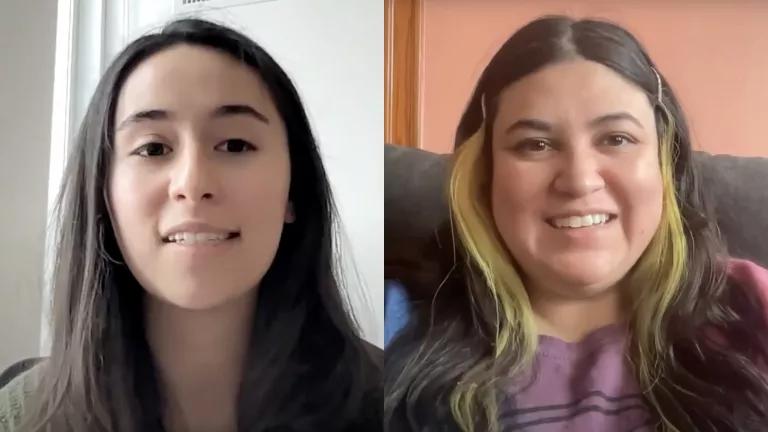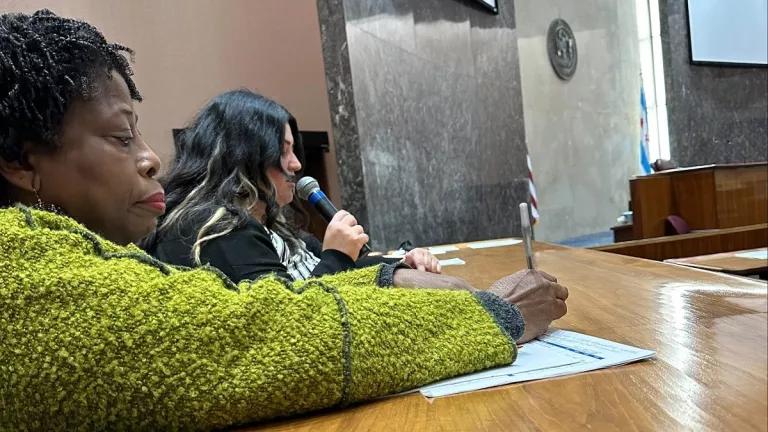Years Later, Lead Pipes Remain in Chicago
My mom has been applying for Chicago’s Equity Lead Service Line Replacement Program for the past two years. In response, she’s gotten nothing but rejections after jumping through hundreds of hoops.

Marcelina Pedraza at her home in the East Side neighborhood of Chicago on June 3, 2021. Pedraza had her water tested for lead in January 2020, and lead was present in three samples.
Taylor Glascock for NRDC
If you ask someone which U.S. city has the biggest lead-contaminated water problem, they may immediately answer Flint, Michigan, or Newark, New Jersey, recalling those high-profile lead crises.
But they may not know my hometown of Chicago has more than 400,000 lead pipes potentially contaminating water across the city, more pipes than any other city in the country. And a recent investigation by the Guardian found that one in 20 tap water tests performed for thousands of Chicago residents found lead at or above U.S. government limits, and one-third had more lead than is permitted in bottled water. Notably, nine of the top 10 Chicago zip codes with the largest percentages of high lead levels were neighborhoods with majorities of Black and Latino residents.
While I was growing up, this was definitely top of mind. In my parents' household, we always drank bottled water, as did most families on the Southeast Side of Chicago.
My neighborhood is also heavily industrialized with some of the dirtiest and most dangerous facilities in the city. Steel mills, concrete crushers, and metal scrapyards all fill the air with pollution. There are contamination issues in the soil, air, and water.
As I grew older, I discovered no amount of lead is safe when consumed, and as a parent, that's really concerning. It dawned on me that that's why my mom probably had us drinking bottled water when we were growing up, because she knew the detrimental effect that lead has on growing minds and bodies.
Our water pipes are essentially just lead straws that our children are drinking from, and I don't think the city or Mayor Lori Lightfoot is taking this seriously.
This is evident in Chicago’s new process for low-income residents: the Equity Lead Service Line Replacement Program. My mother qualifies for the program as she is low-income, retired, and disabled. My sister Giuliana also lives with her, along with my 13-year-old nephew. My mom was really excited when she found out about this program and the possibility of not having to buy bottled water anymore and to be able to put a glass under her tap and safely give her growing grandchild some fresh water. But to her dismay, this application process has been a nightmare.
There are so many complicated steps that she has had to go through over these past two years trying to qualify for the program. From obtaining a deed to her house and showing her utility bills to getting a report card for my nephew from his Chicago public school. Then there was the struggle to get all these documents uploaded to the city’s website, which kept crashing. As my sister told the Guardian, “I’m not exaggerating; I would say it took us about 12 times. It was just too much stuff.” She continued, “This past summer, we were still getting notices from the city that more documents were needed, although we’re not sure which ones. It’s really aggravating.”
And the final headache my mom had to go through was to get a valid driver’s license. Because of the pandemic, there is a moratorium on getting licenses but with this application, she had to get a valid license. We had to drive her into the city to sit at the DMV, and she’s disabled.
It doesn’t seem equitable to have to fill out 13 checklists in order to qualify for this program. It’s been an arduous process with a lot of back-and-forth. And to this day, my mom is still getting her application rejected for missing a few key documents.
But she’s very persistent and hopeful that, in the future, she will get her lead service line replaced because it’s something that she takes very seriously.
The city promised to replace many lead service lines, and the fact that those promises from the mayor are going unfulfilled is severely flying under the radar. In 2020, the mayor announced plans to replace 650 lead pipes by the end of 2021, but as of this month, only 180 of the city’s 400,000 lead lines have been replaced.
And instead of creating a better process for the equity line replacement program application, the mayor’s solution was to create Chicagwa—canned Lake Michigan water—to promote the city’s drinking water. Chicagwa truly felt like a slap in the face and not a solution that the residents of Chicago need.
The city touts that this fresh water goes through a 10-step purification process but fails to mention the most important factor: You can go through all these purification processes with tap water, but it’s still going through a lead service line that is severely toxic to humans.
The mayor is trying to convince everyone that nothing is wrong and is spending hundreds of thousands of dollars on a public relations campaign when she really needs to be spending those dollars on investing in infrastructure and in Chicago's health.
The city needs to remedy this as soon as possible, because at the rate we're going, it's going to take hundreds of years to replace all the lead service lines in Chicago. In my son's lifetime, I want him to be able to put a glass under his tap and consume healthy water. And I know that's what my mother has always dreamed of.
We're trying to be persistent and patient with this application process, but frankly, it has been awful.
And after two years of struggling with this application process, you have to find humor somewhere. When I asked my mom, during her second try, if she finally got approved, she said, “Gina, I don't know what more the city needs from me. I've given them everything they need for this application. It feels like the city wants to see my underwear now.”
Although that's really funny, it's also really sad because the process shouldn't have to be this hard. My mother is trying to enjoy her retirement, trying to create a better life for my nephew and for my son when we go and visit, and the city is just making this impossible. Hopefully, the city gets its act together and creates a more equitable process for replacing lead service lines in Chicago.



